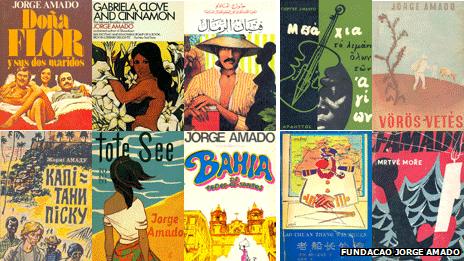Jorge Amado: Brazil celebrates its master story-teller
- Published

"I'm under no illusions about the importance of my work," the writer Jorge Amado once said. "But if it has any worth, it is that it truly reflects the Brazilian people."
As Brazil celebrates the centenary of his birth, Amado is remembered as one of the country's most important, and best-loved writers, famous not only at home but internationally.
His vivid portrayal of his fellow countrymen and women struck a chord, and he created characters who captured the popular imagination.
Translated into 49 languages and published in 55 countries, his books reflect Brazil's culture, inequalities and contradictions.
The 100th anniversary of his birth is being marked by events throughout the year in Brazil, and also in cities like London, Paris, Salamanca and Lisbon.
Continued interest in Amado's work has led to more than 45 deals being signed in the past three years to publish his novels abroad. And to coincide with his centenary, Penguin Classics is bringing out two of his books in English.
"Jorge Amado didn't write books, he wrote a country," was the view of Mozambican author Mia Couto.
Amado, who died in 2001, did more to project his country's image abroad than all government institutions combined, he said.
Amado's gaze fell upon the poor and the rich, black Brazilians and mixed race. His novels are populated by fishermen, street children, caretakers, prostitutes, immigrants, working men and women - and those who exploited them.
But Jorge Amado's stories do not only shed light on Brazil for foreign readers.
Amado, who wrote more than 30 books, highlighted many aspects of Brazilian culture that were either taken for granted or conveniently ignored by Brazilians themselves.
"He revealed important questions for Brazil to reflect on, such as racism, our way of mixing different religious beliefs and the 'Brazilian way' ('jeitinho brasileiro') of going around the law," says Ilana Goldstein, author of The Best-Selling Brazil of Jorge Amado: Literature and National Identity.
Racism
Amado was born in the north-eastern state of Bahia, whose culture, music and religion were deeply influenced by the arrival of African slaves.
His books stress Brazil's African heritage, and the mixing of races that defines the country's population, as positive values.
Amado wrote his first novel in 1931 but by the end of the decade his stories were being published in France.
Amado's foreign success was partly boosted by his politics. He was a militant communist, which helped his work reach the Soviet Union and other countries behind the Iron Curtain.
But his politics also led him into exile in 1947. He was elected to Congress but with the Cold War, the Brazilian Communist Party was banned - and his mandate revoked.
He spent five years in Paris and Czechoslovakia with his wife, Zelia Gattai, travelling extensively and mixing in circles that included Pablo Picasso, Jean-Paul Sartre and Simone de Beauvoir.
Amado's earlier books portray social injustice and are heavily influenced by his political views.
He wrote the first Brazilian book with a black main character in the 1930s. Other unlikely heroes for the time followed, from a prostitute to a black caretaker who contests a white professor's racist theories in university.
"He brought the ordinary man from the street to the centre of the book. He establishes him as the hero of his stories, so winning over many ordinary workers as readers," says Eduardo de Assis Duarte, author of Jorge Amado: Romance in Times of Utopia.
In the 1950s, after the world became aware of the crimes of Soviet leader Joseph Stalin, he abandoned communism and began a new phase in writing, with more humour and less ideology.
Amado defined himself as a story-teller and was more interested in reaching as many people as possible than in creating a literary style of his own.
His books are accessible, with plenty of characters, action and melodrama, and written in colloquial, and at times ribald, language.
This partly explains why he was snubbed by Brazilian academics for a long time, seen by many as a lesser writer.
It also explains why so many of his books have been turned into films, TV soap operas and plays.
"The texts seem to almost have been written for this, with short paragraphs ready to be adapted for cinema, TV, theatre," said Prof Assis Duarte.
New landscape
Milton Hatoum, one of Brazil's most important contemporary writers, was 14 when he first read a Jorge Amado novel in his home city of Manaus in the Amazon.
The book was Captains of the Sands, which tells the story of street children living a wretched and violent life in Salvador, the state capital of Bahia, in the 1930s.
"To me the world was Manaus, surrounded by water and forest. Suddenly I was transported to a whole different place with these street children. It was the revelation of a different social and geographical landscape in the same country."
Even today, he says, it is amazing to see how widely Amado's books are known.
"He was a popular writer in a country where people don't read much, where there is no literary tradition, although there are great writers," says Hatoum.
"The world he created is full of lively, colourful, sensual characters. Not exotic. But then again, they may seem exotic to those who have never seen what Brazil and Bahia are like."